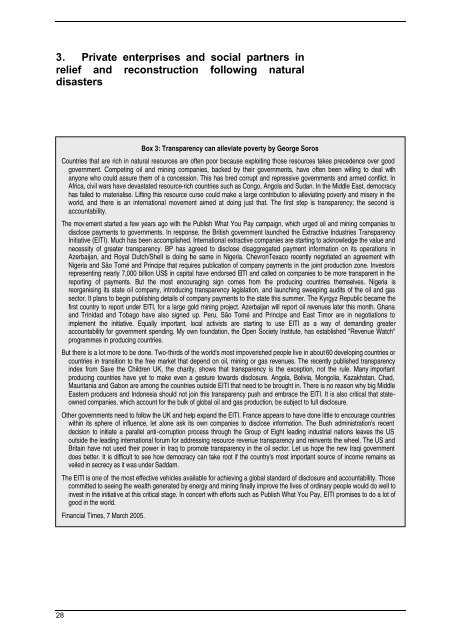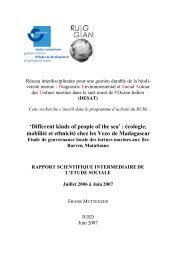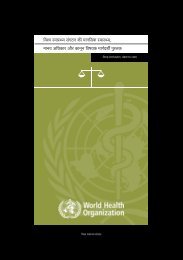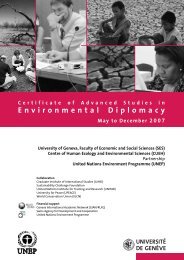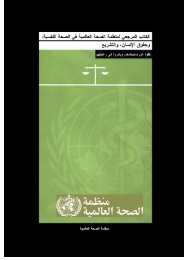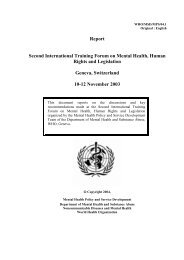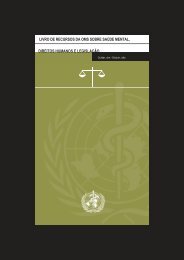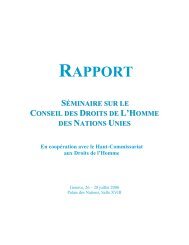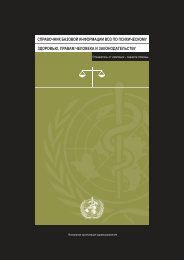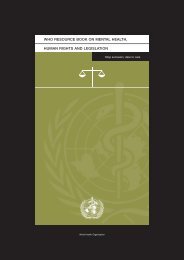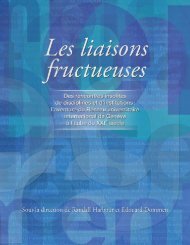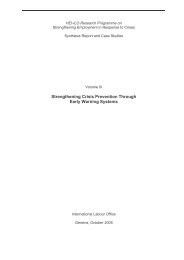Volume 1 Cedric - revised luca Final - RUIG-GIAN
Volume 1 Cedric - revised luca Final - RUIG-GIAN
Volume 1 Cedric - revised luca Final - RUIG-GIAN
You also want an ePaper? Increase the reach of your titles
YUMPU automatically turns print PDFs into web optimized ePapers that Google loves.
3. Private enterprises and social partners inrelief and reconstruction following naturaldisastersBox 3: Transparency can alleviate poverty by George SorosCountries that are rich in natural resources are often poor because exploiting those resources takes precedence over goodgovernment. Competing oil and mining companies, backed by their governments, have often been willing to deal withanyone who could assure them of a concession. This has bred corrupt and repressive governments and armed conflict. InAfrica, civil wars have devastated resource-rich countries such as Congo, Angola and Sudan. In the Middle East, democracyhas failed to materialise. Lifting this resource curse could make a large contribution to alleviating poverty and misery in theworld, and there is an international movement aimed at doing just that. The first step is transparency; the second isaccountability.The mov ement started a few years ago with the Publish What You Pay campaign, which urged oil and mining companies todisclose payments to governments. In response, the British government launched the Extractive Industries TransparencyInitiative (EITI). Much has been accomplished. International extractive companies are starting to acknowledge the value andnecessity of greater transparency. BP has agreed to disclose disaggregated payment information on its operations inAzerbaijan, and Royal Dutch/Shell is doing the same in Nigeria. ChevronTexaco recently negotiated an agreement withNigeria and São Tomé and Principe that requires publication of company payments in the joint production zone. Investorsrepresenting nearly 7,000 billion US$ in capital have endorsed EITI and called on companies to be more transparent in thereporting of payments. But the most encouraging sign comes from the producing countries themselves. Nigeria isreorganising its state oil company, introducing transparency legislation, and launching sweeping audits of the oil and gassector. It plans to begin publishing details of company payments to the state this summer. The Kyrgyz Republic became thefirst country to report under EITI, for a large gold mining project. Azerbaijan will report oil revenues later this month. Ghanaand Trinidad and Tobago have also signed up. Peru, São Tomé and Principe and East Timor are in negotiations toimplement the initiative. Equally important, local activists are starting to use EITI as a way of demanding greateraccountability for government spending. My own foundation, the Open Society Institute, has established "Revenue Watch"programmes in producing countries.But there is a lot more to be done. Two-thirds of the world's most impoverished people live in about 60 developing countries orcountries in transition to the free market that depend on oil, mining or gas revenues. The recently published transparencyindex from Save the Children UK, the charity, shows that transparency is the exception, not the rule. Many importantproducing countries have yet to make even a gesture towards disclosure. Angola, Bolivia, Mongolia, Kazakhstan, Chad,Mauritania and Gabon are among the countries outside EITI that need to be brought in. There is no reason why big MiddleEastern producers and Indonesia should not join this transparency push and embrace the EITI. It is also critical that stateownedcompanies, which account for the bulk of global oil and gas production, be subject to full disclosure.Other governments need to follow the UK and help expand the EITI. France appears to have done little to encourage countrieswithin its sphere of influence, let alone ask its own companies to disclose information. The Bush administration's recentdecision to initiate a parallel anti-corruption process through the Group of Eight leading industrial nations leaves the USoutside the leading international forum for addressing resource revenue transparency and reinvents the wheel. The US andBritain have not used their power in Iraq to promote transparency in the oil sector. Let us hope the new Iraqi governmentdoes better. It is difficult to see how democracy can take root if the country's most important source of income remains asveiled in secrecy as it was under Saddam.The EITI is one of the most effective vehicles available for achieving a global standard of disclosure and accountability. Thosecommitted to seeing the wealth generated by energy and mining finally improve the lives of ordinary people would do well toinvest in the initiative at this critical stage. In concert with efforts such as Publish What You Pay, EITI promises to do a lot ofgood in the world.Financial Times, 7 March 2005.28


